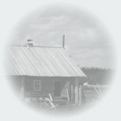Haikola
Of all the old villages of Kalevala district, the village entirety of Haikola is best preserved.
The village is situated on an island of lake Kotijärvi, which belongs to Kepajoki body of water. Haikola is situated approximately 40 kilometres from Uhta in the direction of Kemi. It has never been a large village; the size of the island (lenght only 1 km and width 0,5 km) has set limits to the growth. Although in the beginning of the last century the habitation spread to the inland side (Väärä), but the only preserved houses – altogether seven – are situated on the island. In 1905 there were 11 houses and 84 inhabitants.
Nowadays there are ten houses in Haikola. By the projects realized by Finnish Juminkeko Foundation, there has been built three new traditional houses. The Ortjo Stepanov Foundation has been working as a partner and executor in the projects. Funding has been received from the Finnish Cultural Foundation, from the neighbourhood collaboration funds of the Ministry of Foreign Affairs of Finland, Kalevala Society and through the EU funded program ENPI.
The housing stock is entirely traditional and applicable to the landscape. The graveyard of Haikola is one of the most beautiful in Viena Karelia.
Haikola's old name is Jouhkola by the first known inhabitant of the village. The story, in the family's oral tradition, tells that Jouhko was the grandson of the founder of the village. The grandfather had left from his previous place Tuhkasenvaara, because there had been bears peeking in from the windows, and to avoid them he settled on an island.
The most well known person from Haikola is the national writer Ortjo Stepanov – in Karealian: Jouhko's Kalaska's Vaske's Oleksey's Pekka's Miihkali's Ortjo. When Finnish academic Borenius was listening to his grandfathers grandfather, Vaske of Kalaska, and his mothers fathers mother, Moarie of Karppa, in 1872, he stated Haikola being the last runosong regions in the east.
Kalaska and Vaske were known as wise men, and their knowledge was transmitted by Ortjo's great grandfather Simana, and mothers father Ohvo. Ortjo's fathers Miihkali's runosong has been recorded by Viktor Yevseyev, a folklorist from Petrozavodsk.
